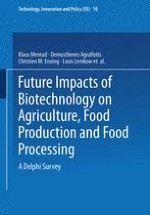Although the first Agro-Food products based on modem biotechnology (e. g. recombinant chymosin for cheese production; tomato puree based on genetically engineered tomatoes; herbicide-resistant, genetically modified soybean; insect resistant maize) have been introduced in the EU markets in recent years, the application of this technology is still being intensively discussed in the European Union. Recent opinion polls indicate as well that consumers' acceptance of genetically engineered food and agro-products still is relatively low (e. g. European Commission 1997, Hampel et al. 1997), at least in some member states of the EU. In contrast, representatives from politics and industry underline the necessity to apply modem biotechnology in the Agro-Food sector as well, mainly to ensure the competitiveness of EU agriculture and food industry and for employment reasons. Against this background there seems to be a need for a scientific analysis of the future impacts of modem biotechnology in the Agro-Food sector of the EU. Recent studies trying to analyse this issue (e. g. OECD 1992, Teuber 1992) usually comprise extrapolations of status-quo analyses. What has not been exploited so far in this context are systematic technology forecasting approaches which do not include only one single country, but get information on an international level. Therefore, the impacts of modem biotechnology on the Agro-Food sector in five member countries of the EU (Germany, Greece, Italy, the Netherlands, and Spain) have been analysed with the help of the Delphi methodology which represents one of the most reliable tools for technology forecasting.
